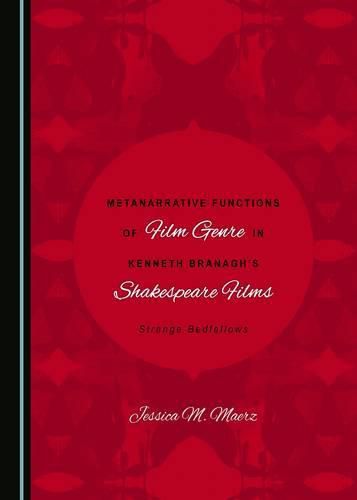Readings Newsletter
Become a Readings Member to make your shopping experience even easier.
Sign in or sign up for free!
You’re not far away from qualifying for FREE standard shipping within Australia
You’ve qualified for FREE standard shipping within Australia
The cart is loading…






Kenneth Branagh is the most important contemporary figure in the production of filmed Shakespeare. His five feature-length Shakespeare films, Henry V (1989), Much Ado About Nothing (1993), Hamlet (1996), Love’s Labour’s Lost (2000) and As You Like It (2007) both created and represented the explosion of filmed Shakespeare adaptations that began in the 1990s. This book demonstrates Branagh’s appeal to classical film genres in order to meta-narrate for a popular audience the unfamiliar terrain of the Shakespearean original; it examines the debts Branagh owes, stylistically and structurally, to classically-defined generic modes. The generic appeal in Branagh’s films is one that grows progressively, becoming incrementally more critical to his Shakespearean adaptations as Branagh’s career progresses. Thus, his debut film, Henry V, is the least classically generic of all his films, relying primarily on intertextual and generic references to more contemporary styles, like the action genre and the Vietnam War film. Much Ado About Nothing represents a transitional moment in Branagh’s generic development; while the film closely accords to the norms of the screwball comedy, this generic correspondence derives primarily from the Shakespearean text. With Hamlet, Branagh begins to experiment with genre as a conceptual conceit: although the film owes much to classical domestic melodrama, particularly in Hamlet’s relationships with Gertrude and Ophelia, Branagh frames his domestic story with devices drawn from the classical Hollywood historical epic. Branagh’s spectacular failure Love’s Labour’s Lost demonstrates a unique subordination of the logic and authority of the Shakespearean source text to the demands of the classical musical form. Finally, Branagh’s most recent film, As You Like It, reveals a new approach towards working with filmed Shakespeare, while simultaneously re-working the generic structures and practices that characterize his earlier, more successful films.
$9.00 standard shipping within Australia
FREE standard shipping within Australia for orders over $100.00
Express & International shipping calculated at checkout
Kenneth Branagh is the most important contemporary figure in the production of filmed Shakespeare. His five feature-length Shakespeare films, Henry V (1989), Much Ado About Nothing (1993), Hamlet (1996), Love’s Labour’s Lost (2000) and As You Like It (2007) both created and represented the explosion of filmed Shakespeare adaptations that began in the 1990s. This book demonstrates Branagh’s appeal to classical film genres in order to meta-narrate for a popular audience the unfamiliar terrain of the Shakespearean original; it examines the debts Branagh owes, stylistically and structurally, to classically-defined generic modes. The generic appeal in Branagh’s films is one that grows progressively, becoming incrementally more critical to his Shakespearean adaptations as Branagh’s career progresses. Thus, his debut film, Henry V, is the least classically generic of all his films, relying primarily on intertextual and generic references to more contemporary styles, like the action genre and the Vietnam War film. Much Ado About Nothing represents a transitional moment in Branagh’s generic development; while the film closely accords to the norms of the screwball comedy, this generic correspondence derives primarily from the Shakespearean text. With Hamlet, Branagh begins to experiment with genre as a conceptual conceit: although the film owes much to classical domestic melodrama, particularly in Hamlet’s relationships with Gertrude and Ophelia, Branagh frames his domestic story with devices drawn from the classical Hollywood historical epic. Branagh’s spectacular failure Love’s Labour’s Lost demonstrates a unique subordination of the logic and authority of the Shakespearean source text to the demands of the classical musical form. Finally, Branagh’s most recent film, As You Like It, reveals a new approach towards working with filmed Shakespeare, while simultaneously re-working the generic structures and practices that characterize his earlier, more successful films.